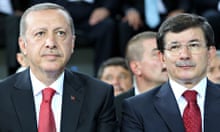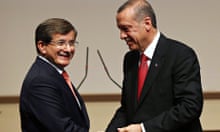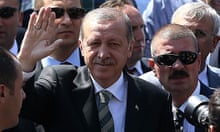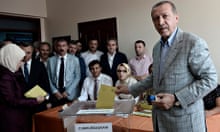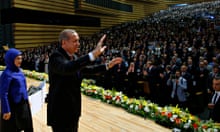Turkey has been engulfed by a series of protests across several cities after riot police turned Istanbul's busiest city centre hub into a battleground, deploying tear gas and water cannon against thousands of peaceful demonstrators.
In one of the biggest challenges to the 10-year rule of the prime minister, Recep Tayyip Erdogan, demonstrators took to the streets of Ankara, Izmir, Bodrum and several other cities as well as Istanbul to vent their frustration at what is seen to be an increasingly authoritarian administration.
The air of government nervousness was reinforced by the relative lack of mainstream media coverage of the drama in central Istanbul, fuelling speculation that the Erdogan government was leaning on the main television stations to impose a blackout on the ugly scenes.
Following several days of dawn police raids on the protesters seeking to occupy Gezi park on Taksim Square in Istanbul city centre, the clashes escalated violently, leaving more than 100 people injured, several of them seriously.
Police went on the rampage against protesters who had been sitting reading books and singing songs.
There was widespread criticism of the heavy-handed intervention and of the government, which is committed to demolishing the park to erect a shopping centre.
The US state department said: "We certainly support universally peaceful protests, as we would in this case." In Brussels, MEPs called on the EU to act.
What started at the beginning of the week as an environmental protest aimed at saving an Istanbul city centre park from shopping centre developers backed by the government appeared to be snowballing into a national display of anger at the perceived high-handedness of the Erdogan government.
"They have declared war on us," said an Istanbul shopkeeper in a back street, as he handed out lemon juice to counter the teargas to protesters. "This is out of all proportion."
"Today is a turning point for the AKP," said Koray Caliskan, a political scientist at Istanbul's Bosphorus University. "Erdogan is a very confident and very authoritarian politician, and he doesn't listen to anyone anymore. But he needs to understand that Turkey is no kingdom, and that he cannot rule Istanbul from Ankara all by himself."
Ugur Tanyeli, an architecture historian, said: "The real problem is not Taksim, and not the park, but the lack of any form of democratic decision-making process and the utter lack of consensus. We now have a PM who does whatever he wants."
The protests started late on Monday after developers tore up trees to make way for the controversial construction project featuring a shopping centre in nostalgic Ottoman style and building a replica of an old military barracks.
Police staged consecutive raids on protesters, using tear gas and water cannon, but the protests grew in scale, with artists, intellectuals and opposition MPs joining the ranks.
According to the Istanbul Medical Chamber, at least 100 people were injured during the police raids on Friday . Some sustained injuries when a wall they were trying to climb collapsed as they fled from the tear gas. At least seven people were treated for head wounds. Later on Friday police also used tear gas against protesters in Ankara.
In Istanbul, Sirri Süreyya Önder, an MP from the Kurdish BDP party, was taken to hospital after he was reportedly hit in the shoulder by a tear gas cartridge.
Amnesty International condemned the "use of excessive force" by police.
There were reports of a woman having died. In a sign of the tension, amateur video footage showed Turkish military personnel refusing to help the riot police, as well as handing out gas masks to demonstrators. There were also reports that some of the police had switched sides and joined the protests.
With the Erdogan government facing an uncommon popular challenge after 10 years in power, an MP from the governing AK party angered the protesters, tweeting: "It looks like some people needed gas." Sirin Ünal added: "If you go away, you will have a nice day. One has to obey the system."
For the burgeoning protest movement, the park issue is the tip of the iceberg. Another building project, the construction of a bridge spanning the Bosphorus, was launched this week, with Erdogan dismissing public opinion.
"They can do whatever they want," he said. "We've made our decision, and we will do as we have decided," he said. He defended the reconstruction of the Ottoman barracks as a matter of "respecting history". Opponents argue the project will destroy one of the last green spaces in central Istanbul for the sake of private profit.
"How can you show respect for something that does not exist?" asked Tanyeli. "We don't even know what the barracks looked like exactly. To say that this project has anything to do with the reconstruction of a historical building is ridiculous.
"We all know how starved Istanbul is for green space. It needs this park so much more than yet another shopping mall."
Several retailers announced they would not open stores in the planned shopping centre. "I would not open a store in a place where blood has been shed," businessman Selami Sari told the Turkish press.
The park protests show signs of escalating into demonstrations against a prime minister who remains popular and dominates national politics, but is seen as increasingly authoritarian.
"Turkey is not doing well, not doing well at all," said Coskun Ince after several days protesting. "We have to fight for our rights, and now they deny us the few rights we still have."
The protest was unusual in that it brought together young and old, the rightwing and leftists, and nationalist Turks and Kurds. They complained of issues beyond the planned shopping centre from government policy on the war in neighbouring Syria to new curbs on alcohol and a recent row about kissing in public.
"We are fed up," said Cansu Kahvecioglu, a student. "They don't give us any breathing space anymore."
